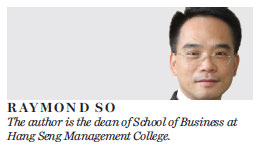Political uncertainty will continue in Hong Kong
Updated: 2015-06-11 08:02
By Raymond So(HK Edition)
|
|||||||
The constitutional reform bill will soon be debated and voted on in the Legislative Council. At present, it seems unlikely that the bill will be passed by LegCo. Nevertheless, many "pan-democrats" believe voting on it should be done as soon as possible. This is an unusual attitude. In the past, they used to have lengthy debates on bills and then filibuster. They would question everything just to show they were interested. But this time some "pan-democratic" lawmakers do not want to spend time debating; they want to kill the bill quickly. This is so there will not be the slightest chance of it getting passed.
Although voting on the bill is still to take place, the chance of getting a large majority in favor of or opposed to it is now no longer possible. Most likely the bill will not be passed - or it will be passed by a very narrow margin. No matter which of these two possibilities occur, society must face the realities of "the day after". Nobody knows what this will bring. The future development of Hong Kong is full of uncertainty.
The first thing to consider is that the mistrust and lack of cooperation between LegCo and the SAR government will only get worse. The relationship between the executive and legislature is not good. Every time government officials meet lawmakers in LegCo, things are usually pretty tense. The level of mutual respect and trust on both sides is weak. After voting on the bill, no matter whether it is passed or not, this situation will only worsen in future.
If the bill is not passed, the government will suffer a major setback. Re-building the relationship between the executive and legislative branches will be very difficult. Even if the government eventually gets the bill passed, it will only do so by a small margin. Those who vote against the bill will continue to oppose the government. The government will then face a more confrontational atmosphere in LegCo. In other words, the "day after" will mean a more difficult situation than the one existing today. Everything will be chaotic until the district council elections in November. The results of these elections will give clearer picture of what the future will be like.
The second thing to consider is the impact of the district council elections in November and LegCo election next year. The district council elections will see the system of appointed members being abolished. The campaign for electoral reform in Hong Kong has, to some extent, changed the shape of district council elections. Previously, these were mainly concerned about the livelihoods of residents living in these districts. A district councilor could be elected from a small community. So it was not surprising to see that district councilors were more concerned about livelihood issues in their own districts. Some had a strong connection with their voters and they will have a big influence on LegCo elections next year.
Consequently, district council elections in November can be considered a disguised "public referendum" on electoral reform. The number of seats won by "pan-democrats" in district council elections may indicate how much public support they enjoy. If the "pan-democrats" do well in these elections, their criticism of constitutional reform will intensify. But if they suffer defeats, new forces from different political groups will emerge. This will result in unpredictable changes to the opposition camp. The more extreme politicians are likely to test their influence during these elections.
A third consideration is the relationship between Hong Kong and the mainland. Senior central government officials have made it clear that the framework laid down by the National People's Congress Standing Committee cannot be changed. After voting on electoral reform, there is also the question of how the "pan-democrats" will be able to communicate with Beijing. The fundamental issue of mistrust and lack of cooperation between the two sides still remains. The "pan-democrats" are not likely to get better at communicating with Beijing. But Hong Kong cannot stand alone and ignore the central government. Communication with Beijing remains the biggest weakness of the "pan-democrats".

(HK Edition 06/11/2015 page10)